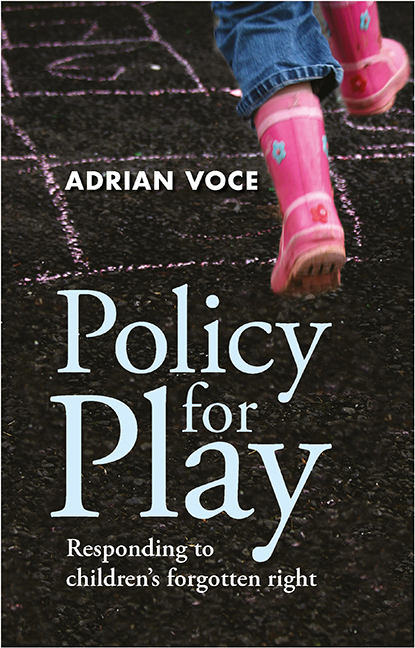Book contents
- Frontmatter
- Dedication
- Contents
- Who’s who
- About the author
- Preface
- Foreword
- Prologue
- Introduction ‘To respect, protect and fulfil’
- one ‘To play and to dream’ • Restoring play to the heart of the campaign for children’s rights
- two ‘For a change’ • Finding the evidence for play policy
- three ‘Advocates for play’ • Playwork’s place at the heart of the play movement
- four ‘New opportunities’ • Lottery funding and the beginnings of public play policy
- five ‘A vital and vibrant city’ • How devolved government in London set a benchmark for play policy
- six ‘Making the case’ • The call for a national play strategy
- seven ‘Things to do, places to go?’ • How play was overlooked by children’s services reform
- eight ‘Getting serious’ • The national play review
- nine ‘Lottery millions’ • The Children’s Play Initiative
- ten ‘Dirt is good’ • The Play England project
- eleven ‘The best place in the world’ • The Play Strategy for England
- twelve ‘Playbuilders’ • Breaking the mould of the public playground
- thirteen ‘Everyday adventures?’ • Austerity brings an end to play policy in England
- fourteen ‘Skylarks and canaries’ • The legacy of the Play Strategy
- fifteen ‘Children now’ • Responding to children’s right to play: conclusions and recommendations
- Epilogue
- References
- Index
one - ‘To play and to dream’ • Restoring play to the heart of the campaign for children’s rights
Published online by Cambridge University Press: 08 March 2022
- Frontmatter
- Dedication
- Contents
- Who’s who
- About the author
- Preface
- Foreword
- Prologue
- Introduction ‘To respect, protect and fulfil’
- one ‘To play and to dream’ • Restoring play to the heart of the campaign for children’s rights
- two ‘For a change’ • Finding the evidence for play policy
- three ‘Advocates for play’ • Playwork’s place at the heart of the play movement
- four ‘New opportunities’ • Lottery funding and the beginnings of public play policy
- five ‘A vital and vibrant city’ • How devolved government in London set a benchmark for play policy
- six ‘Making the case’ • The call for a national play strategy
- seven ‘Things to do, places to go?’ • How play was overlooked by children’s services reform
- eight ‘Getting serious’ • The national play review
- nine ‘Lottery millions’ • The Children’s Play Initiative
- ten ‘Dirt is good’ • The Play England project
- eleven ‘The best place in the world’ • The Play Strategy for England
- twelve ‘Playbuilders’ • Breaking the mould of the public playground
- thirteen ‘Everyday adventures?’ • Austerity brings an end to play policy in England
- fourteen ‘Skylarks and canaries’ • The legacy of the Play Strategy
- fifteen ‘Children now’ • Responding to children’s right to play: conclusions and recommendations
- Epilogue
- References
- Index
Summary
Of all the human rights specific to children as defined by the UN Convention on the Rights of the Child (1989), the right to play has become known as ‘the forgotten right’. The UK, in this respect, is not untypical; although it has a reputation internationally for its progressive thinking on play (Hart, p xvii, this volume), only in Wales is there a clear statutory duty on local authorities to make universal provision for it. And it is not only governments that seem to neglect the importance of play relative to other children’s rights; in particular, the dominance of education over play provision as a recognised issue tends to be reflected in the work of children’s rights’ advocacy bodies too.
The Children’s Rights Alliance for England (CRAE), for example, in its annual review of government action on the CRC, found that ‘a child’s right to play and recreation suffers from poor recognition of its importance, and a lack of investment by government at national and local level’ (CRAE, 2014). The review refers to the UNCRC’s own report of 2008, which called on the UK government to guarantee Article 31 for all children. The review also found that, across the 32 (of 152) local authorities able to comply with a Freedom of Information request on play budgets, there had been an ‘overall reduction’ of 54% between the years 2008-9 and 2014-15; despite this, in its subsequent recommendations the CRAE report calls for subsidies and quality benchmarks in early years settings and a statutory universal youth offer but has no proposals for play policy (CRAE, 2014)
However, while the right to play may have been largely overlooked not only by the parties of government but also by those who would influence them on behalf of children, it was in fact a central part of the argument of the modern children’s rights movement at its origins early in the last century. The UN’s General Comment No. 17 (2013) notes that an earlier Declaration of the Rights of the Child (UN, 1959) proclaimed that: ‘society and the public authorities shall endeavour to promote the enjoyment of this right [to play]’. In fact, it was in 1913 that the right to play was at the forefront of the changes demanded by the embryonic movement that would lead all the way to the CRC.
- Type
- Chapter
- Information
- Policy for PlayResponding to Children's Forgotten Right, pp. 13 - 20Publisher: Bristol University PressPrint publication year: 2015



